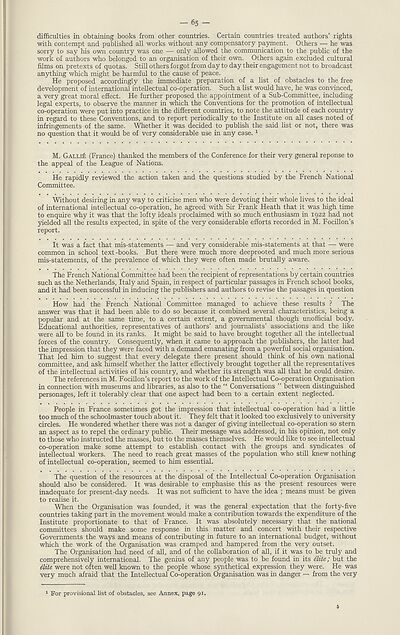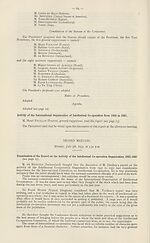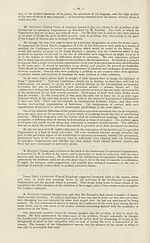International > Proceedings of the second General conference of national committees on intellectual co-operation, Paris, July 5th-9th, 1937
(67)
Download files
Complete book:
Individual page:
Thumbnail gallery: Grid view | List view

—* 65 —
difficulties in obtaining books from other countries. Certain countries treated authors’ rights
with contempt and published all works without any compensatory payment. Others — he was
sorry to say his own country was one — only allowed the communication to the public of the
work of authors who belonged to an organisation of their own. Others again excluded cultural
films on pretexts of quotas. Still others forgot from day to day their engagement not to broadcast
anything which might be harmful to the cause of peace.
He proposed accordingly the immediate preparation of a list of obstacles to the free
development of international intellectual co-operation. Such a list would have, he was convinced,
a very great moral effect. He further proposed the appointment of a Sub-Committee, including
legal experts, to observe the manner in which the Conventions for the promotion of intellectual
co-operation were put into practice in the different countries, to note the attitude of each country
in regard to these Conventions, and to report periodically to the Institute on all cases noted of
infringements of the same. Whether it was decided to publish the said list or not, there was
no question that it would be of very considerable use in any case. 1
M. Gallic (France) thanked the members of the Conference for their very general reponse to
the appeal of the League of Nations.
He rapidly reviewed the action taken and the questions studied by the French National
Committee.
Without desiring in any way to criticise men who were devoting their whole lives to the ideal
of international intellectual co-operation, he agreed with Sir Frank Heath that it was high time
to enquire why it was that the lofty ideals proclaimed with so much enthusiasm in 1922 had not
yielded all the results expected, in spite of the very considerable efforts recorded in M. Focillon’s
report.
It was a fact that mis-statements — and very considerable mis-statements at that — were
common in school text-books. But there were much more deeprooted and much more serious
mis-statements, of the prevalence of which they were often made brutally aware.
The French National Committee had been the recipient of representations by certain countries
such as the Netherlands, Italy and Spain, in respect of particular passages in French school books,
and it had been successful in inducing the publishers and authors to revise the passages in question
How had the French National Committee managed to achieve these results ? The
answer was that it had been able to do so because it combined several characteristics, being a
popular and at the same time, to a certain extent, a governmental though unofficial body.
Educational authorities, representatives of authors’ and journalists’ associations and the like
were all to be found in its ranks. It might be said to have brought together all the intellectual
forces of the country. Consequently, when it came to approach the publishers, the latter had
the impression that they were faced with a demand emanating from a powerful social organisation.
That led him to suggest that every delegate there present should think of his own national
committee, and ask himself whether the latter effectively brought together all the representatives
of the intellectual activities of his country, and whether its strength was all that he could desire.
The references in M. Focillon’s report to the work of the Intellectual Co-operation Organisation
in connection with museums and libraries, as also to the “ Conversations ” between distinguished
personages, left it tolerably clear that one aspect had been to a certain extent neglected.
People in France sometimes got the impression that intellectual co-operation had a little
too much of the schoolmaster touch about it. They felt that it looked too exclusively to university
circles. He wondered whether there was not a danger of giving intellectual co-operation so stern
an aspect as to repel the ordinary public. Their message was addressed, in his opinion, not only
to those who instructed the masses, but to the masses themselves. He would like to see intellectual
co-operation make some attempt to establish contact with the groups and syndicates of
intellectual workers. The need to reach great masses of the population who still knew nothing
of intellectual co-operation, seemed to him essential.
The question of the resources at the disposal of the Intellectual Co-operation Organisation
should also be considered. It was desirable to emphasise this as the present resources were
inadequate for present-day needs. It was not sufficient to have the idea ; means must be given
to realise it.
When the Organisation was founded, it was the general expectation that the forty-five
countries taking part in the movement would make a contribution towards the expenditure of the
Institute proportionate to that of France. It was absolutely necessary that the national
committees should make some response in this matter and concert with their respective
Governments the ways and means of contributing in future to an international budget, without
which the work of the Organisation was cramped and hampered from the very outset.
The Organisation had need of all, and of the collaboration of all, if it was to be truly and
comprehensively international. The genius of any people was to be found in its elite; but the
elite were not often well known to the people whose synthetical expression they were. He was
very much afraid that the Intellectual Co-operation Organisation was in danger — from the very
1 For provisional list of obstacles, see Annex, page 91.
5
difficulties in obtaining books from other countries. Certain countries treated authors’ rights
with contempt and published all works without any compensatory payment. Others — he was
sorry to say his own country was one — only allowed the communication to the public of the
work of authors who belonged to an organisation of their own. Others again excluded cultural
films on pretexts of quotas. Still others forgot from day to day their engagement not to broadcast
anything which might be harmful to the cause of peace.
He proposed accordingly the immediate preparation of a list of obstacles to the free
development of international intellectual co-operation. Such a list would have, he was convinced,
a very great moral effect. He further proposed the appointment of a Sub-Committee, including
legal experts, to observe the manner in which the Conventions for the promotion of intellectual
co-operation were put into practice in the different countries, to note the attitude of each country
in regard to these Conventions, and to report periodically to the Institute on all cases noted of
infringements of the same. Whether it was decided to publish the said list or not, there was
no question that it would be of very considerable use in any case. 1
M. Gallic (France) thanked the members of the Conference for their very general reponse to
the appeal of the League of Nations.
He rapidly reviewed the action taken and the questions studied by the French National
Committee.
Without desiring in any way to criticise men who were devoting their whole lives to the ideal
of international intellectual co-operation, he agreed with Sir Frank Heath that it was high time
to enquire why it was that the lofty ideals proclaimed with so much enthusiasm in 1922 had not
yielded all the results expected, in spite of the very considerable efforts recorded in M. Focillon’s
report.
It was a fact that mis-statements — and very considerable mis-statements at that — were
common in school text-books. But there were much more deeprooted and much more serious
mis-statements, of the prevalence of which they were often made brutally aware.
The French National Committee had been the recipient of representations by certain countries
such as the Netherlands, Italy and Spain, in respect of particular passages in French school books,
and it had been successful in inducing the publishers and authors to revise the passages in question
How had the French National Committee managed to achieve these results ? The
answer was that it had been able to do so because it combined several characteristics, being a
popular and at the same time, to a certain extent, a governmental though unofficial body.
Educational authorities, representatives of authors’ and journalists’ associations and the like
were all to be found in its ranks. It might be said to have brought together all the intellectual
forces of the country. Consequently, when it came to approach the publishers, the latter had
the impression that they were faced with a demand emanating from a powerful social organisation.
That led him to suggest that every delegate there present should think of his own national
committee, and ask himself whether the latter effectively brought together all the representatives
of the intellectual activities of his country, and whether its strength was all that he could desire.
The references in M. Focillon’s report to the work of the Intellectual Co-operation Organisation
in connection with museums and libraries, as also to the “ Conversations ” between distinguished
personages, left it tolerably clear that one aspect had been to a certain extent neglected.
People in France sometimes got the impression that intellectual co-operation had a little
too much of the schoolmaster touch about it. They felt that it looked too exclusively to university
circles. He wondered whether there was not a danger of giving intellectual co-operation so stern
an aspect as to repel the ordinary public. Their message was addressed, in his opinion, not only
to those who instructed the masses, but to the masses themselves. He would like to see intellectual
co-operation make some attempt to establish contact with the groups and syndicates of
intellectual workers. The need to reach great masses of the population who still knew nothing
of intellectual co-operation, seemed to him essential.
The question of the resources at the disposal of the Intellectual Co-operation Organisation
should also be considered. It was desirable to emphasise this as the present resources were
inadequate for present-day needs. It was not sufficient to have the idea ; means must be given
to realise it.
When the Organisation was founded, it was the general expectation that the forty-five
countries taking part in the movement would make a contribution towards the expenditure of the
Institute proportionate to that of France. It was absolutely necessary that the national
committees should make some response in this matter and concert with their respective
Governments the ways and means of contributing in future to an international budget, without
which the work of the Organisation was cramped and hampered from the very outset.
The Organisation had need of all, and of the collaboration of all, if it was to be truly and
comprehensively international. The genius of any people was to be found in its elite; but the
elite were not often well known to the people whose synthetical expression they were. He was
very much afraid that the Intellectual Co-operation Organisation was in danger — from the very
1 For provisional list of obstacles, see Annex, page 91.
5
Set display mode to:
![]() Universal Viewer |
Universal Viewer | ![]() Mirador |
Large image | Transcription
Mirador |
Large image | Transcription
Images and transcriptions on this page, including medium image downloads, may be used under the Creative Commons Attribution 4.0 International Licence unless otherwise stated. ![]()
| League of Nations > International > Proceedings of the second General conference of national committees on intellectual co-operation, Paris, July 5th-9th, 1937 > (67) |
|---|
| Permanent URL | https://digital.nls.uk/195218046 |
|---|
| Shelfmark | LN.XII |
|---|
| Description | Over 1,200 documents from the non-political organs of the League of Nations that dealt with health, disarmament, economic and financial matters for the duration of the League (1919-1945). Also online are statistical bulletins, essential facts, and an overview of the League by the first Secretary General, Sir Eric Drummond. These items are part of the Official Publications collection at the National Library of Scotland. |
|---|---|
| Additional NLS resources: |
|

